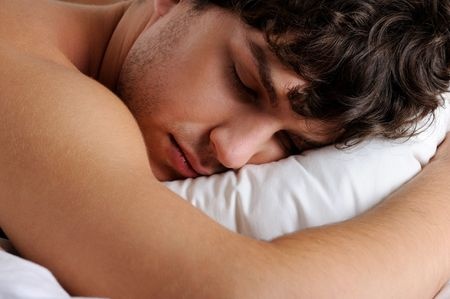People Who Sleep On Their Stomachs Have More Sex Dreams
March 1, 2016 by Justin Lehmiller
Most people have sex dreams. In fact, studies have found that as many as 93% of men and 86% of women say they’ve had them before [1]. For some, these dreams occur quite frequently; however, for others, they’re uncommon. Why is that? It might have to do with differences in the positions people sleep in.
In a recent study published in the journal Dreaming, researchers surveyed 670 college students (34% male, 66% female) in Hong Kong [2]. Participants were asked to report how often they have certain types of dreams (including those of a sexual nature), as well as the intensity of those dreams. They were also asked to report how often they sleep in different positions, including on their front, back, and side.
The vast majority of participants (71%) reported having one dominant sleeping position. For most (72%), this was sleeping on one’s side. The rest reported sleeping on their backs (23%) or on their stomachs (5%).
Erotic dreams were unrelated to sleeping on one’s back or side; however, they were linked to sleeping on one’s stomach.
Specifically, the more frequently people slept on their stomachs, the more likely they were to report dreams about sex and about being nude. Incidentally, sleeping on one’s stomach was also related to dreams of being locked up or tied up, being smothered, as well as seeing UFOs.
So why was sleeping face down linked to having more frequent sex dreams? These data don’t allow us to say with certainty; however, the author’s preferred theory is that this position creates some amount of physical pressure on the genitals and that this is being transferred into people’s dreams, thereby making them more likely to be erotic in nature.
Likewise, the author also theorizes that because sleeping on one’s stomach can put pressure on the chest and potentially make breathing difficult, these sensations might be converted to dreams about being confined or suffocated.
More research is needed to determine whether there’s anything to these ideas; in the meantime, however, these findings suggest the provocative possibility that our dreams may be, at least in part, a function of our sleep position.
Want to learn more about Sex and Psychology ? Click here for previous articles or follow the blog on Facebook (facebook.com/psychologyofsex), Twitter (@JustinLehmiller), or Reddit (reddit.com/r/psychologyofsex) to receive updates.
[1] Schredl, M., Ciric, P., GÖtz, S., & Wittmann, L. (2004). Typical dreams: Stability and gender differences. The Journal of Psychology, 138, 485-494.
[2] Yu, C.K.C. (2012). The effect of sleep position on dream experiences. Dreaming, 22, 212-221.
Image Source: 123rf.com/Vitaly Valua
You Might Also Like:

Dr. Justin Lehmiller
Founder & Owner of Sex and PsychologyDr. Justin Lehmiller is a social psychologist and Research Fellow at The Kinsey Institute. He runs the Sex and Psychology blog and podcast and is author of the popular book Tell Me What You Want. Dr. Lehmiller is an award-winning educator, and a prolific researcher who has published more than 50 academic works.
Read full bio >


